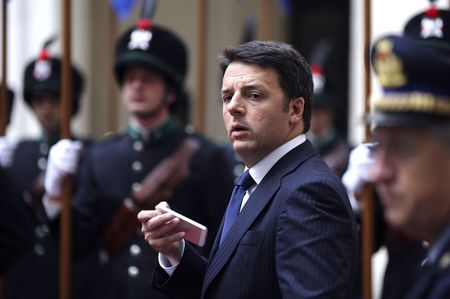By Isla Binnie and Gavin Jones
ROME (Reuters) - Italians voted on Sunday in regional ballots which will test whether the country, tired of economic stagnation and austerity, is also wearying of Matteo Renzi's nine-month old coalition government.
Renzi's popularity peaked in June shortly after a landslide victory in European parliament elections, but his ruling party has been steadily slipping lower in opinion polls since, as the economy stutters and joblessness remains stubbornly high.
The public mood has soured in recent weeks, with labour unions marching through cities, and clashes between police and residents in poorer neighbourhoods of Milan and Rome after dark.
Opinion polls suggest the candidates from Renzi's Democratic Party (PD), which is still by far the country's biggest party, are favourites to win over a divided centre-right.
More than 5.3 million people are eligible to vote for governors in the northern Emilia-Romagna region, and Calabria at Italy's southern tip.
Local factors will play a big role in the ballots, which were called after the outgoing governors were forced to resign in corruption scandals, but they remain 39-year-old Renzi's first electoral test since winning 41 percent of the European vote.
Renzi campaigned in both regions this week and scuffles broke out between police and demonstrators awaiting his arrival in Parma, one of Emilia-Romagna's main cities.
On Friday evening in Calabria, Renzi appealed to deep-rooted local concerns about high joblessness, organised crime and lower availability of childcare than in the industrialised north.
Soon after toppling his predecessor in a party coup, Renzi was nicknamed "Demolition Man" for his commitment to breaking old Italian political structures, but he has yet to deliver promised reforms and revive the economy.
Planned changes to labour laws that impede hiring and firing - partly blamed for Italy's economy shrinking around 9 percent since 2007 - have met fierce union opposition.
The right-wing Northern League, which is exploiting growing anti-immigrant sentiment, is focusing on Emilia. Party leader Matteo Salvini appealed on Facebook to his "Emiliani and Romagnoli friends" to vote for his party's candidate.
The anti-establishment 5-Star Movement, whose leader Beppe Grillo made a surprise visit to Emilia-Romagna on Friday, wants to consolidate its position as Italy's second-largest party.
Turnout will also indicate whether voter apathy is still rising. In Calabria, 46 percent voted in the European elections, versus 70 percent in Emilia-Romagna.
Emilia's outgoing governor, PD-affiliated Vasco Errani, resigned in June after being convicted of fraud. Giuseppe Scopelliti governed Calabria until March when he was given jail time for abuse of office and false accounting.

Polls close at 2200 GMT on Sunday.
(Additional reporting by Roberto Landucci; Editing by Raissa Kasolowsky)